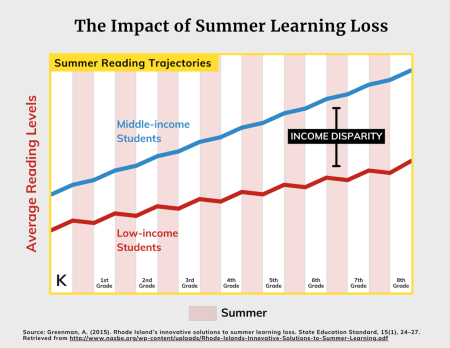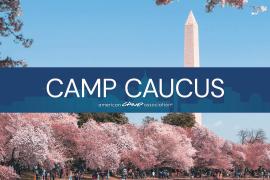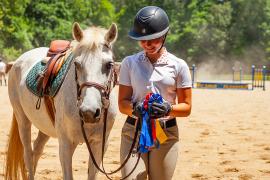Summer camps have long been cherished as vibrant spaces for adventure, exploration, and personal growth.
The American Camp Association (ACA) frequently highlights the transformative power of these experiences, underscoring their role in fostering character-building, skill development, and a sense of community. However, there's a crucial aspect to summer camps that often goes unnoticed — their potential to combat summer learning loss.
During the summer months, many children experience a backslide in academic skills, commonly referred to as "summer learning loss." This phenomenon can be particularly pronounced in areas like reading and math, where students may lose up to two months of academic instruction. This setback is even more significant among students from lower-income backgrounds, contributing to a widening achievement gap.
Recent analysis from Margaret Raymond, PhD, founding director of the Center for Research on Education (CREDO) at Stanford University, highlights the urgency of addressing educational challenges intensified by the pandemic. Raymond's analysis suggests that even extending traditional education by five years may not suffice to bring all students up to grade level, emphasizing the limitations of current remedial strategies like tutoring and conventional summer school.(1) In this context, summer camps emerge as uniquely effective settings for project-based, experiential learning. They provide an opportunity for young learners to engage in collaborative problem-solving, critical thinking, and independent decision-making, all within an environment that blends enjoyment with meaningful educational activities.
The Reality of Summer Slide: What the Data Shows
Summer learning loss, often referred to as the “summer slide,” is a phenomenon where students lose academic skills and knowledge over the summer break. This setback is particularly evident in core areas such as reading and mathematics. When combined with the learning losses experienced from COVID-19, it acts as a double whammy for academic achievement. Many students are now facing challenges that leave them years behind their expected level of education. The effects of learning loss are cumulative and contribute significantly to the widening achievement gap between students of varying socio-economic backgrounds.
The Extent of Summer Learning Loss
Recent research by Brown University (2) revealed that, on average, students experienced a loss of 17 percent to 34 percent of the learning gains they had made in the previous academic year over the summer break. Additionally, it was observed that students who faced learning setbacks during one summer were more prone to similar setbacks in subsequent summers.
- Achievement Scores: Research by the American Educational Resource Association (3) indicates that students typically experience a decline in achievement scores over summer vacation equivalent to one month of school-year learning, with a sharper decline in math compared to reading.
- Math Scores: According to research by Harvard (4), students lose about two months of grade level equivalency in mathematical computation skills over the summer. The lack of practice and reinforcement of these skills contributes to this decline.
- Impact of Summer Reading Programs: Recent analysis focusing on summer reading programs found that they were effective at raising test scores, especially for low-income students who are likely to experience summer loss. (5)
- Income Based Disparities: Middle-class students tend to improve in reading skills over the summer, while lower-income students experience a loss in reading skills. (6)
- Long-Term Effects: The cumulative effect of summer learning loss can be substantial. By the time a student reaches middle school, they could be years behind their peers, particularly in critical subjects like math and reading.

Turning Camps into Learning Hubs: A Data-Driven Approach
Summer camps have the potential to be more than just a place for outdoor adventures and making new friends; they can also serve as vital learning hubs. By integrating data-driven strategies into camp programming, we can create a harmonious balance between fun and learning, addressing summer learning loss at the same time!
The key to this transformation lies in using data and research to inform the design of camp activities. This involves understanding the specific areas where students are most likely to experience learning loss and tailoring activities to target these areas. For instance, if data shows a significant drop in math skills over the summer, camps can incorporate math-focused activities that are engaging and contextually relevant.
Ideas For Data-Driven Camp Activities
- Nature-Based Math: Use the natural environment as a classroom. Activities like measuring the height of trees using simple trigonometry, or calculating the area of leaves blend math skills with outdoor exploration. This not only helps maintain math skills but also instills a love for nature and science!
- Storytelling around the Campfire: Encourage campers to create and share stories, fostering literacy skills. This activity can be structured to focus on vocabulary, narrative skills, and creativity, addressing the reading and writing components susceptible to summer learning loss.
- Scientific Experiments: Design simple science experiments that campers can conduct, which teach the scientific method and critical thinking skills. For example, studying the water quality of a nearby lake or observing wildlife behavior can be both educational and fun!
- Historical Treasure Hunts: Organize treasure hunts that require campers to solve puzzles based on historical facts or figures. This can help reinforce history knowledge and encourage teamwork and problem-solving skills.
- Journaling and Reflective Writing: Encourage campers to maintain a journal. Writing about their daily experiences can enhance writing skills and provide a way to reflect on their learning and personal growth.
By employing these data-driven activities, camps can become effective learning hubs, ensuring that the fun of summer is complemented by meaningful educational experiences. This approach not only mitigates the effects of summer learning loss but also enriches the overall camp experience, making learning an integral and enjoyable part of the summer adventure.
The Role of Technology in Enhancing Camp Education
Integrating tech tools into camp programs can provide unique and innovative learning opportunities while preserving the quintessential camp experience centered around nature, adventure, and social interaction.
The key to successfully incorporating technology in camps lies in a balanced approach. It's about selecting tools that complement rather than replace traditional camp activities. For instance, tech can be used to deepen understanding of the natural world, facilitate creative expression, or enhance the collaboration among campers.
Tech Tools for Camp Learning:
- Mobile Apps: Mobile apps like PictureThis can help identify plants, birds, insects, and animals during hikes or nature walks. Star Walk can be used for stargazing and learning about the constellations.
- Digital Storytelling: Encourage campers to document their camp experiences or create stories using digital tools like video and audio editors. These are skills they will take with them into the future.
- E-Readers and E-Books: Provide access to e-readers or digital library services for reading and literacy activities, ensuring a steady supply of age-appropriate reading material.
- Fitness and Health Trackers: Utilize fitness trackers to educate campers about physical health and wellness. These devices can monitor activities like hiking, swimming, and other camp sports.
- Virtual Reality (VR) and Augmented Reality (AR): Use VR/AR for immersive learning experiences, such as virtual field trips to historical sites or simulations of ecological systems.
Balancing Technology with Traditional Camp Experiences
While technology offers numerous advantages, it's essential to strike a balance. Camps should ensure that technology use doesn't overshadow outdoor activities and face-to-face interactions that are central to the camp experience. Setting specific times for tech use, focusing on group activities using technology, and ensuring that tech tools are used to enhance outdoor and social experiences, rather than replace them, are key strategies in maintaining this balance.
By thoughtfully integrating technology into camp programs, we can create an environment where the charm of traditional camping is augmented with the benefits of modern educational tools. This blended approach not only resonates with the interests and expectations of today's tech-savvy generation, making camps more enjoyable and relevant for them, but it also aligns with modern educational methods.
Embracing the Future of Summer Learning: The Path Ahead
As we conclude, it's evident that transforming summer camps into dynamic learning hubs through data-driven educational activities offers a promising solution to the challenge of summer learning loss. The strategies outlined in this article underscore the importance of reimagining these camps not just as places of leisure, but as integral components of a child's educational journey.
The Impact of a Holistic Approach
By intertwining fun with learning, camps can address the academic slide while also promoting personal development and social skills. The blend of nature-based math, storytelling, scientific exploration, historical treasure hunts, and reflective writing exemplifies a holistic approach to learning. This method not only curbs the summer slide but also fosters a lifelong love for learning and exploration.
Technology: A Catalyst for Enhanced Learning
The role of technology in enhancing the educational value of summer camps cannot be overstated. With the thoughtful integration of mobile apps, digital storytelling, e-readers, and even AR/VR experiences, camps can provide a more engaging and diverse learning experience. These tech tools, when used judiciously, complement traditional activities, ensuring that the essence of camping is preserved while infusing modern educational techniques.
The Way Forward for Summer Camps
Looking ahead, the challenge for summer camps is to continuously evolve and adapt to the changing educational landscape. Camp organizers and educators must stay abreast of the latest educational research and technology trends, ensuring that their programs remain relevant and effective in combating summer learning loss.
A Closing Thought
In essence, the journey toward reducing summer learning loss and enriching the summer camp experience is a collaborative effort that involves educators, parents, policymakers, and most importantly, the students themselves. By embracing data-driven strategies and integrating technology wisely, we can transform summer camps into enriching environments where fun meets learning, creating memories that educate and last a lifetime.
This blog is sponsored by Excel High School, a fully accredited online high school that has been at the forefront of providing flexible, quality education since 2005. Excel High School is devoted to combating summer learning loss and finding innovative solutions to educate students year-round. We understand the importance of continuous learning and are dedicated to creating resources and programs that support students during the summer months. Our aim is to ensure that students remain academically engaged, reducing the impact of the summer slide and fostering a love for lifelong learning. Learn more about our school.
- ACAcamps.org/article/camping-magazine/addressing-educational-gaps-through-camp#:~:text=In%20a%20recent,it%E2%80%99s%20too%20late
- edworkingpapers.com/sites/default/files/SchoolsOut_AtteberryMcEachin_2020_0520.pdf
- journals.sagepub.com/doi/10.3102/00346543066003227
- gse.harvard.edu/ideas/usable-knowledge/16/06/summer-math-loss
- journals.sagepub.com/doi/10.3102/0034654313483906
- journals.sagepub.com/doi/abs/10.3102/0013189X16677965?journalCode=edra
Photo credit: PeopleImages/iStock via Getty Images.
Periodically, the American Camp Association (ACA) makes timely and relevant information about products and services available to its members so they can make informed decisions for their camps. However, the ACA does not endorse products, services, or companies.
The views and opinions expressed by contributors are their own and do not necessarily reflect the views of the American Camp Association or ACA employees.



